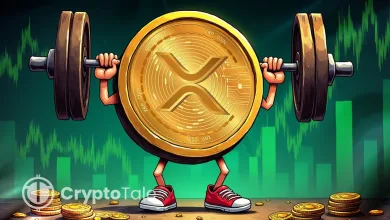Solana’s Alpenglow Targets 150ms Finality, Rivals Visa

- Solana’s Alpenglow aims to slash transaction finality from 12.8 seconds to 150 ms.
- Validators show over 99% support for the Alpenglow upgrade, ensuring near-certain approval.
- The upgrade could position Solana to rival Visa and expand into global financial markets.
Solana is preparing for a major leap in blockchain performance. Its new Alpenglow protocol promises transaction finality at 150 milliseconds. That speed rivals global payment giants like Visa and outpaces many traditional financial systems. For Solana, this proposal is more than a technical change. It signals a bid to transition from being a fast crypto network to a contender for global markets.
Validators Back Alpenglow with Overwhelming Support
The Alpenglow proposal has received overwhelming backing from Solana validators. More than 99% of votes cast so far support the upgrade. The governance process began on August 21, and voting will close at epoch 842 on Tuesday. Data confirms that participation already crossed the 33% quorum threshold, making approval highly likely.
If implemented, Alpenglow will cut Solana’s finality from 12.8 seconds to just 150 milliseconds. This represents a near 100-fold improvement. The blockchain would surpass rivals like Sui, which has finality at around 400 milliseconds. Analysts note that such speeds even outpace Google searches, which average 200 milliseconds.
Anza, a development firm spun out of Solana Labs, introduced the Alpenglow design in May. Researchers behind the proposal said the upgrade can unlock new categories of blockchain use. With real-time responsiveness, Solana could expand into areas demanding instant settlement. These include institutional finance, advanced trading platforms, and gaming ecosystems that rely on latency-free interaction.
Alpenglow is composed of two major components: Votor and Rotor. Votor processes voting transactions and aims to finalize blocks in one round if 80% of the stakeholders participate. If participation drops to 60%, finalization completes in two rounds. Rotor, meanwhile, handles data dissemination and removes reliance on Solana’s Proof-of-History timestamping system. Together, the mechanisms are expected to drive efficiency and speed across the network.
Beyond DeFi: Competing With Visa and Capital Markets
Transaction speed has always been central to blockchain competition. Bitcoin processes blocks in about ten minutes, while Ethereum completes inclusion in 12 seconds and reaches finality much later. In contrast, Alpenglow brings Solana’s performance closer to high-frequency trading systems and the near-instant authorization speeds of payment networks like Visa.
The Solana validator community has expressed strong confidence in the proposal. Nearly 172 validators have already voted, representing about 11.8% of the network. With more than 99% of them supporting Alpenglow, the outcome appears clear. For many ecosystem members, this represents the largest upgrade in Solana’s history.
Related: DeFi Development Corp. Expands Solana with DFDV UK Launch
The upgrade, however, will not address every issue. The white paper acknowledged that Alpenglow will not eliminate network outages. Solana currently depends on a single production client, Agave, which leaves it vulnerable to software flaws. To reduce such risks, Firedancer, a new independent validator client, is expected to launch later this year. That client will diversify Solana’s infrastructure and help strengthen resilience.
If successfully implemented, Alpenglow will position Solana as a blockchain capable of competing with internet-scale services. Developers say this is not just about payments or DeFi. The speed could make Solana a settlement layer for capital markets where latency determines efficiency.
The upgrade also demonstrates maturity in governance. Validators overwhelmingly support the transition, demonstrating consensus around scaling Solana into new functions. As the voting is about to come to an end, the focus now shifts to the technical rollout and its effect on performance.




